Leadership is an essential skill that someone can acquire through knowledge, experience, and continuous learning.
If you want to be a better leader and are looking to refine your leadership abilities then the right information can be useful for your success.
You can read many leadership books to learn and implement them to make a difference in your company, team, and your customers.
Here we have curated a list of books that can help you in your first step of finding the best leadership books to read.
These books are read and recommended by many founders and entrepreneurs and made a difference in their lives.
If you want to find a stepping stone for where should I start reading? these are the three books that you can read for becoming a great leader.
- Why Leaders Eat Last By Simon Sinek
- Good to Great By Jim Collins
- The Hard Things About Hard Things by Ben Horowitz
So read these books to become an effective and impactful leader.
Why Leaders Eat Last By Simon Sinek
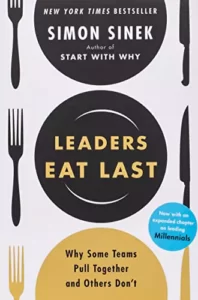
Why Leaders Eat Last is a leadership and management book by Simon Sinek. The book talks about the role of leaders in creating a culture of trust, cooperation, and performance within organizations.
The author took inspiration from tribal cultures and how leaders eat last after ensuring that all members are fed and taken care of.
The book also talks about how teams and organizations function at their peak and what makes great leaders and successful teams.
Lessons From the Book:
Here are some lessons from the book.
- Effective leaders create a culture of trust by prioritizing the safety of their team members.
- The author also talks about the role of hormones in social interaction like the release of oxytocin (the “trust hormone”) and cortisol (the “stress hormone”).
- Leadership is not a rank or privilege, it’s about serving the needs of a team.
Quotes from the Book:
- If your actions inspire others to dream more, learn more, do more, and become more, you are a leader.― Simon Sinek
- You can easily judge the character of a man by how he treats those who can do nothing for him.― Simon Sinek
- Let us all be the leaders we wish we had.― Simon Sinek
- We are not victims of our situation. We are the architects of it.― Simon Sinek
Good to Great By Jim Collins
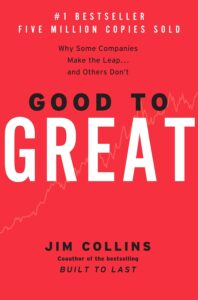
Good to Great is a business book by Jim Collins that explores how certain companies achieve sustained greatness while others do not.
Collins, the author, and his research team conducted a five-year study of publicly traded companies and identified a select group that made the transition to be good to great companies.
In the book, you will be able to learn the principle that great companies and leaders achieve in the long term.
Lessons From the Book:
Here are some lessons from the book.
- The author introduces the concept of level 5 leadership where leaders possess a rare combination of personal humility and professional will.
- This book also introduces the Hedgehog concept which centers around that great companies focus on doing one thing exceptionally well.
- The flywheel effect is a series of small, consistent actions that build momentum over time.
Quotes from the Book:
- The purpose of bureaucracy is to compensate for incompetence and lack of discipline.― Jim Collins
- Greatness is not a function of circumstance. Greatness, it turns out, is largely a matter of conscious choice, and discipline.― Jim Collins
- Great vision without great people is irrelevant.― Jim Collins
- A company should limit its growth based on its ability to attract enough of the right people.― Jim Collins
The Hard Thing About Hard Things By Ben Horowitz
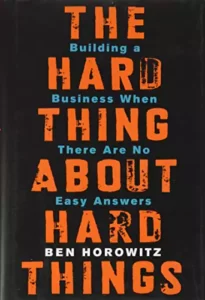
The Hard Things About Hard Things By Ben Horowitz is an entrepreneurship and business book that talks about the experience as CEO of various technology companies.
The book offers practical advice for building and leading a successful startup.
The book involves the ups and downs of entrepreneurs as a startup, making tough decisions in difficult times, taking challenges and many more insights that make takes to build a company.
Lessons From the Book:
Here are some lessons from the book.
- Entrepreneurship is filled with intense challenges, uncertainty, and difficult decisions.
- Managing layoffs is a difficult but sometimes necessary step in a company’s survival.
- It is important to build a strong company culture to scale a successful product.
Quotes from the Book:
- Sometimes an organization doesn’t need a solution; it just needs clarity.― Ben Horowitz
- Hard things are hard because there are no easy answers or recipes. They are hard because your emotions are at odds with your logic. They are hard because you don’t know the answer and you cannot ask for help without showing weakness.― Ben Horowitz
- Spend zero time on what you could have done, and devote all of your time to what you might do.― Ben Horowitz
Dare to Lead By Brene Brown
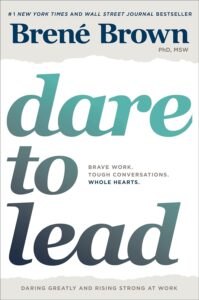
Dare to Lead is a leadership book by Brene Brown that explores the qualities and behaviors that make a leader effective in this rapidly changing world.
The book touches on the culture and attitude of daring leadership within organizations and how leaders make innovations, creativity, and compassion in the team and organization.
The also talks about vulnerability, empathy, and authenticity in leadership and how it makes a leader dare to succeed.
Lessons From the Book:
Here are some lessons from the book.
- Brown introduces the concept of the “marble bar” to build trust in small, consistent actions over time.
- It is important to align your leadership values in difficult times.
- It is important to set clear boundaries as a leader to build a culture of respect and trust.
Quotes from the Book:
- At the end of the day, at the end of the week, at the end of my life, I want to say I contributed more than I criticized.― Brené Brown
- Clear is kind. Unclear is unkind.― Brené Brown
- Show up for people in pain and don’t look away.― Brené Brown
- We fail the minute we let someone else define success for us.― Brené Brown
7 Habits of Highly Effective People By Stephen R. Covey
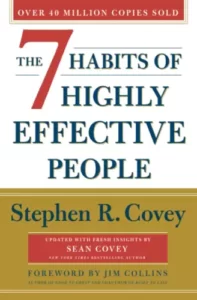
The 7 Habits of Highly Effective People is a timeless self-help and personal development book by Stephen R. Covey. The book talks about developing personal and professional effectiveness with the help of character development, ethics, and principles.
The author presents the 7 Habits framework as a roadmap for individuals to transform their lives and achieve success.
The author also introduced the idea of “paradigm shift”—a change in perspective that can significantly impact one’s effectiveness.
This book is one of the best self-help books that transform you from inside and outside and lead you to become successful in your life.
Lessons From the Book:
Here are some lessons from the book.
- Being proactive and taking responsibility for one’s choice is the key to building positive relationships.
- Effective listening and communication are important to build a positive relationship.
- Continuously improving physically, mentally, emotionally, and spiritually is essential for long-term effectiveness.
Quotes from the Book:
- Sow a thought, reap an action; sow an action, reap a habit; sow a habit, reap a character; sow a character, reap a destiny.― Stephen R. Covey
- Two people can see the same thing, disagree, and yet both be right. It’s not logical; it’s psychological.― Stephen R. Covey
- It’s not what happens to us, but our response to what happens to us that hurts us.― Stephen R. Covey
- Happiness, like unhappiness, is a proactive choice.― Stephen R. Covey
Start With Why By Simon Sinek
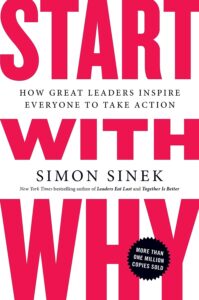
Start with Why is another leadership and business book by Simon Sinek. The book explores the importance of understanding the “why” behind individuals and organizations.
The book explores identifying the true purpose of why they exist and how leaders and organizations can inspire and motivate others.
The book will help leaders to find the “why” to move forward to motivate employees and customers.
The author presents many examples from companies like Apple, and Southwest Airlines to people like Martin Luther King Jr.
Lessons From the Book:
Here are some lessons from the book.
- Starting with “Why” allows individuals and organizations to tap into the emotional and motivational aspects of a human being.
- The Golden Circle framework provides a visual tool to help leaders and organizations communicate their purpose and goals.
- Effective leader are those who can clearly inspire others with their vision and purpose.
- Staying true to the vision of an organization is key to maintaining consistency with its purpose.
Quotes from the Book:
- People don’t buy what you do; they buy why you do it. And what you do simply proves what you believe.― Simon Sinek
- Great companies don’t hire skilled people and motivate them, they hire already motivated people and inspire them.― Simon Sinek
- You don’t hire for skills, you hire for attitude. You can always teach skills.― Simon Sinek
Lean In By Sheryl Sanderson

Lean In by Sheryl Sanderson is a highly influential and thought-provoking book that addresses the challenges women face in the workspace and provides a guide on how to achieve gender equality and leadership roles.
Drawing from her own experience as a highly-ranked executive at Facebook, the author explores the problems women face in the workplace and the barriers they face in their careers.
This book also covers a wide range of topics like imposter syndrome, work-life balance, negotiation, gender bias, and mentorship.
This is a must-read if you are a leader to know what women face in work and also a must-read for women to get their true credits in work.
Lessons From the Book:
Here are some lessons from the book.
- Women often underestimate their abilities and qualifications compared to men.
- It is important to look at one’s value of being authentic in the workspace rather than being gender biased.
- Women should lean into leadership roles, take on challenging projects, and pursue their ambitions.
Quotes from the Book:
- Guilt management can be just as important as time management for mothers.—Sheryl Sanderson
- Every job will demand some sacrifice. The key is to avoid unnecessary sacrifice.—Sheryl Sanderson
- Motivation comes from working on things we care about. It also comes from working with people we care about.—Sheryl Sanderson
- The promise of equality is not the same as true equality.—Sheryl Sanderson
The 21 Irrefutable Laws of Leadership By John C. Maxwell
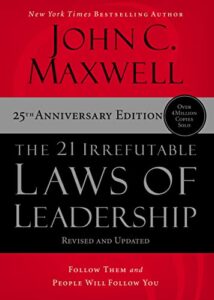
The 21 Irrefutable Laws of Leadership is a leadership book by John C. Maxwell that talks about the principles and laws of leadership.
The book is organized into 21 chapters, each book dedicated to one law with real-life stories and examples. The author talks about various leadership topics like character development, teamwork, vision, relationships, and communication.
This book is an interesting read to find various principles with real-life examples that could help you to become a great leader.
Lessons From the Book:
Here are some lessons from the book.
- Leadership abilities determine a person’s level of effectiveness. To improve one’s effectiveness you should improve your leadership skills.
- Leaders add value to others by contributing to their growth and success.
- Leaders should maintain trust with their team.
Quotes from the Book:
- We cannot become what we need by remaining what we are.― John Maxwell
- Change is inevitable. Growth is optional.― John Maxwell
- Leadership is not about titles, positions, or flowcharts. It is about one life influencing another.― John Maxwell
- A man must be big enough to admit his mistakes, smart enough to profit from them, and strong enough to correct them.― John Maxwell
- Life is 10% of what happens to me and 90% of how I react to it.― John Maxwell
How to Win Friends & Influence People By Dale Carnegie

How to Win Friends and Influence People is a classic self-help book by Dale Carnegie first published in 1936.
The book provides practical advice and principles for improving skills, building positive relationships, and becoming a more effective communicator.
The book also presents advice and real-life examples on showing genuine interest in others, effective listening and communication, handling disagreements, and applying these principles in real life to connect with others.
Lessons From the Book:
Here are some lessons from the book.
- There are three fundamental principles of dealing with people effectively: Don’t criticize, condemn, or complain.
- Be a leader and change people by giving praise and encouragement.
- Win people to your way of thinking by avoiding arguments, and admitting when you are wrong.
Quotes from the Book:
- Every man I meet is my superior in some way. In that, I learn of him.—Dale Carnegie
- Criticisms are like homing pigeons. They always return home.—Dale Carnegie
- Only knowledge that is used sticks in your mind.—Dale Carnegie
- The rare individual who unselfishly tries to serve others has an enormous advantage.—Dale Carnegie
Principles By Ray Dalio
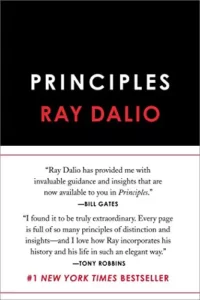
Principles by Ray Dalio is a best-selling book that talks about achieving success in life and work. The author shares his life journey and the principles he developed over the years as the founder of Bridgewater Associates, one of the world’s largest hedge funds.
The book is divided into three parts—the author’s personal story, his life principles, and his work principles. Reading this book, you will be able to find some of the best principles that can help you in your life and work.
Lessons From the Book:
Here are some lessons from the book.
- Open and honest communication within an organization is a great way to build trust and improve decision-making.
- It is important to balance your work and life to become a fulfilling and meaningful existence.
- Embrace reality to face hard reality and problems ahead of you.
- Promote thoughtful disagreements where different viewpoints are valued and explored.
Quotes from the Book:
- It’s more important to do big things well than to do the small things perfectly.― Ray Dalio
- The greatest gift you can give someone is the power to be successful. Giving people the opportunity to struggle rather than giving them the things they are struggling for will make them stronger.― Ray Dalio
- Listening to uninformed people is worse than having no answers at all.― Ray Dalio
Linchpin By Seth Godin
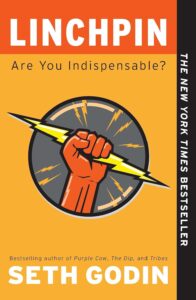
Linchpin by Seth Godin is a book that explores the concept of becoming a linchpin—someone who is important, indispensable, creative, and able to make an impact in their organization and the world.
The book encourages us to move beyond the mindset of a traditional employee and become a person who can make a difference at work.
Lessons From the Book:
Here are some lessons from the book.
- Overcome the internal and external forces that make you hold to be a linchpin.
- It is important to complete your work and ship your work rather than waiting for perfection.
- View your work as art to approach it with passion.
Quotes from the Book:
- An artist is someone who uses bravery, insight, creativity, and boldness to challenge the status quo. And an artist takes it personally.― Seth Godin
- If you are deliberately trying to create a future that feels safe, you will willfully ignore the future that is likely.― Seth Godin
- The secret to being wrong isn’t to avoid being wrong! The secret is being willing to be wrong. The secret is realizing that wrong isn’t fatal.― Seth Godin
The Five Dysfunctions of a Team By Patrick Lencioni
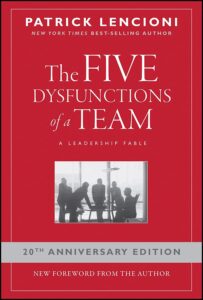
The Five Dysfunctions of a Team is a leadership and team management book by Patrick Lencioni. The book explores the common issues and challenges that teams face in organizations.
The book takes the form of a fictional story of a tech company and as a new CEO of the company, how she was able to change her executive team from a dysfunctional group to a high-performing team.
The book talks about team management and leadership that could help a team to overcome common obstacles and achieve greater success.
Lessons From the Book:
Here are some lessons from the book.
- Building trust among team members is the first step to making a great team.
- Healthy conflict and debate are good for effective decision-making.
- Teams should prioritize collective results rather than individual interests to achieve success.
Quotes from the Book:
- Trust is knowing that when a team member does push you, they’re doing it because they care about the team.― Patrick Lencioni
- Remember teamwork begins by building trust. And the only way to do that is to overcome our need for invulnerability.― Patrick Lencioni
- Great teams do not hold back from one another. They are unafraid to air their dirty laundry. They admit their mistakes, their weaknesses, and their concerns without fear of reprisal.― Patrick Lencioni
Multipliers By Liz Wiseman
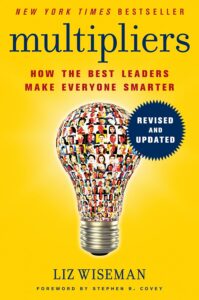
Multipliers is a leadership and management book by Liz Wiseman that talks about the different styles of leadership and their impact on organizations and teams.
The central concept of the book is, that some leaders are called “Multipliers” who motivate the intelligence and capabilities of their teams and others are called “Diminishers” who are unable to find the true potential of their team.
This book tries to look at the multipliers and it attracts talent and trust in the organization.
If you want to be a good leader then you can read this book to learn more about how leaders think, work, and motivate others.
Lessons From the Book:
Here are some lessons from the book.
- Great leaders extract the intelligence, skills, and capabilities of their team.
- Great leaders attract and retain top talents because people want to work in an environment where they can grow.
- Great leaders challenge their team members to stretch beyond their capabilities.
Quotes from the Book:
- Multipliers invoke each person’s unique intelligence and create an atmosphere of genius—innovation, productive effort, and collective intelligence.― Liz Wiseman
- When leaders teach, they invest in their people’s ability to solve and avoid problems in the future.― Liz Wiseman
- The Diminisher is a Micromanager who jumps in and out. The Multiplier is an Investor who gives others ownership and full accountability.― Liz Wiseman
Drive By Daniel H. Pink
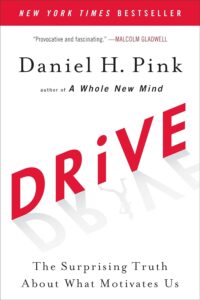
Drive By Daniel H. Pink is a book that challenges the conventional wisdom about motivation and explores the true factors that drive people to do what they do in their lives and workplaces.
The author tries to take a deeper look at the true motivation behind human behavior both in life and at work.
The book explores the intrinsic behaviors and motivations that force someone to do something. If you are not able to find your true motivation in life and want to explore then this book can be a starting point.
Lessons From the Book:
Here are some lessons from the book.
- People are motivated by the desire to improve their skills and knowledge.
- Find and understand the purpose and meaning behind your work to find a sense of motivation in it.
- Allowing individuals to control their work, choices can enhance their motivation and job satisfaction.
Quotes from the Book:
- Control leads to compliance; autonomy leads to engagement.― Daniel H. Pink
- Design. Story. Symphony. Empathy. Play. Meaning. These six senses increasingly will guide our lives and shape our world.― Daniel H. Pink
- To sell well is to convince someone else to part with resources—not to deprive that person, but to leave him better off in the end.― Daniel H. Pink
The Lean Startup By Eric Ries
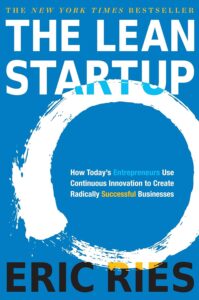
The Lean Startup is a business book by Eric Ries that introduced the principles of Lean Startup methodology which talks about product development, rapid experimentation, and learning taken and applied from customers.
This book is one of the few books that impact the world of entrepreneurship and startups.
The book stands out from the traditional path of startups and encourages them to start small build products quickly and test to real customers to improve products over time by improving the product over time.
This book is one of the must-read books that can change your life.
Lessons From the Book:
Here are some lessons from the book.
- Start small by launching your Minimum Viable Product (MVP) to quickly test your product.
- Prioritize learning and use the data and customer feedback to make decisions.
- Focus on metrics that drive actionable insights and decisions.
- Be prepared to pivot on what you learn from the market and customers.
Quotes from the Book:
- The only way to win is to learn faster than anyone else.― Eric Ries
- Reading is good, action is better.― Eric Ries
- We must learn what customers really want, not what they say they want or what we think they should want.― Eric Ries
Thinking Fast and Slow By Daniel Kahneman
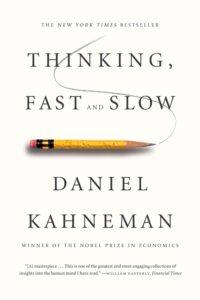
Thinking Fast and Slow is a book by Daniel Kahneman, a Nobel awardee in economics. The book was first published in 2011 and it explores how the human mind thinks and makes decisions and judgements.
The book introduced two types of thinking: System 1, which is fast and intuitive, and System 2, which is slow and deliberate.
The author explores the strengths and weaknesses of these two types of thinking and takes many real-world examples to illustrate these concepts.
Why do we add this book to this list? Leaders need to make critical decisions many times and this book will help you to make better decisions.
Lessons From the Book:
Here are some lessons from the book.
- Understand the two types of thinking and construct your decisions and judgments accordingly.
- Cognitive biases can lead to errors in thinking and decision-making.
- People tend to be overconfident in their judgments and that can lead to errors in terms of risk and uncertainty.
Quotes from the Book:
- Nothing in life is as important as you think it is, while you are thinking about it.― Daniel Kahneman
- Our comforting conviction that the world makes sense rests on a secure foundation: our almost unlimited ability to ignore our ignorance.― Daniel Kahneman
- Intelligence is not only the ability to reason; it is also the ability to find relevant material in memory and to deploy attention when needed.― Daniel Kahneman
The Effective Executive By Peter Drucker

The Effective Executive is a classic management and leadership book by Peter Drucker, a world-famous management consultant.
The book offers many valuable lessons and principles for individuals in leadership roles who want to be more productive and impactful in their work.
This is best for all the managers and early-stage founders who try to be productive in their work.
This will give you lessons for being effective rather than just working hard or longer but doing the right things in the right way.
Lessons From the Book:
Here are some lessons from the book.
- Being an effective executive is a skill and you can acquire the skills by practice.
- Managing your time is crucial for one’s productivity and effectiveness.
- Prioritize tasks and often focus on things that make the most contribution to the organizational goals.
- Recognize your strengths while delegating tasks to others.
Quotes from the Book:
- Intelligence, imagination, and knowledge are essential resources, but only effectiveness converts them into results.― Peter F. Drucker
- Working on the right things is what makes knowledge work effective.― Peter F. Drucker
- If there is any one “secret” of effectiveness, it is concentration. Effective executives do first things first and they do one thing at a time.― Peter F. Drucker
The Art of War By Sun Tzu

The Art of War is an ancient Chinese text attributed to Sun Tzu, a military strategist and philosopher, believed to have lived in the 6th century BCE.
The book is often referred to as one of the most influential texts on strategies, tactics, and warfare ever written.
The book includes principles on business, politics, and strategies that will need to think about when you are a leader. If you want to win in war then this book is the guide to learn about war and its tactics.
Lessons From the Book:
Here are some lessons from the book.
- The art of war emphasizes the importance of strategic thinking and planning in order to achieve success in conflict.
- Use psychological tactics to take advantage of opponents.
- Effective leadership is essential to make significant changes in the order of success.
Quotes from the Book:
- Appear weak when you are strong, and strong when you are weak.—Sun Tzu
- The supreme art of war is to subdue the enemy without fighting.—Sun Tzu
- In the midst of chaos, there is also opportunity.—Sun Tzu
Awaken the Giant Within By Tony Robbins
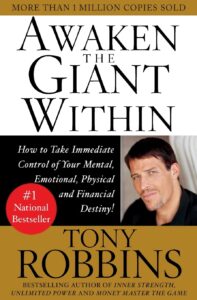
Awaken the Giant Within is a self-help book written by Tony Robbins.
The book offers practical strategies and techniques to take control of your life, achieve your goals, and make positive changes in lives.
This book will help you to transform yourself physically, mentally, and emotionally to improve your life.
Lessons From the Book:
Here are some lessons from the book.
- Take control of your life to shape your destiny.
- Your beliefs can influence your actions so it’s important to look at your beliefs.
- Set clear goals to make steps towards your success.
- Consistent actions are crucial for achieving your goals.
Quotes from the Book:
- Any time you sincerely want to make a change, the first thing you must do is to raise your standards.—Tony Robbins
- Changing an organization, a company, a country—or a world—begins with the simple step of changing yourself.—Tony Robbins
- Your brain can’t tell the difference between something you vividly imagine and something you actually experience.—Tony Robbins
Conclusion
In the journey of becoming a leader, these books will help you as a mentor and sometimes as a friend to guide you in difficult times.
In your personal and professional life, these books will be your guides as you work to become a more inspiring and influential leader. Keep in mind that leadership is about lifelong learning and adaptation.
If you find this list a little overwhelming to start reading which book, then you can start by reading these three books to lay a foundation for becoming a leader.
- Why Leaders Eat Last By Simon Sinek
- Good to Great By Jim Collins
- The Hard Things About Hard Things by Ben Horowitz
Tell me which book you picked and what you learned from it.
Also Read:


